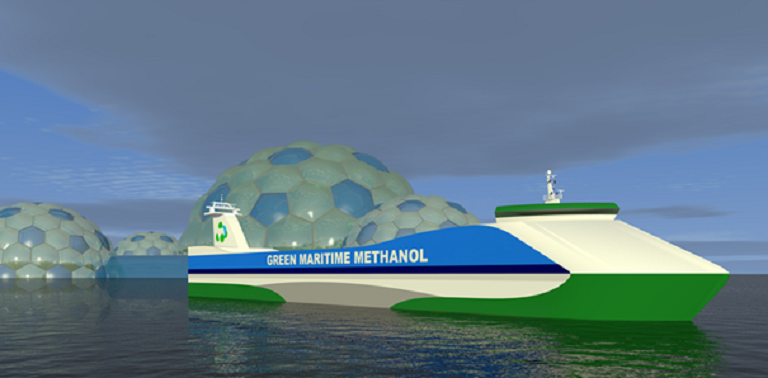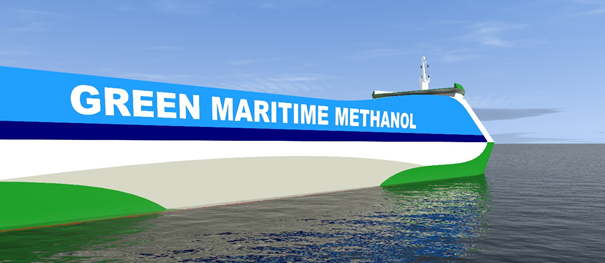The Green Maritime Methanol consortium studies the possibilities for renewable Methanol as a maritime transport fuel. Green Methanol is an important candidate as a future fuel for the shipping industry. It is widely available, can be produced in a sustainable way, is easily stored on board of ships and can be burned in engines with minor modifications.

Within the Green Maritime Methanol project a new milestone has been achieved, the successful start of the engine test programme on 100% methanol. New tests are being planned and two important new partners have joined the consortium recently.
In January 2020 Pon Power started its engine testing programme with a Caterpillar 3508 spark ignited high speed gas engine. With customised cylinder heads and a customised engine control management system the engine operated on 100% methanol as a fuel. The tests were performed successfully and the test setup enables the researchers to study questions with regard to optimisation of ignition timing, lubricating requirements, emissions of e.g. CO2 and NOx. In the coming months Pon Power and the Netherlands’ Defence Academy will continue to perform more engine tests on this Caterpillar 3508 engine.
The Netherlands’ Defence Academy (NLDA) is also preparing a test programme for their MAN engine (type4L20/27). These tests include methanol injection direct in the cylinder blended with diesel which acts as pilot fuel for igniting the mixture. The tests are planned to include both a mixture stabilised by an emulsifier and a mixture blended mechanically. In the longer run also tests are planned with methanol intake via the air inlet and ignition using diesel injected direct in the cylinder. The behaviour of several diesel, methanol and emulsifier compositions is currently being studied in collaboration with TNO Eindhoven and the Netherlands’ Navy Chemical Laboratory in Den Helder. At a later stage tests are planned with methanol intake via the air inlet and ignition using diesel directly injected into the cylinder. During 2020 more engine tests will be executed, providing essential data for several future ship designs and propulsion trains on board.

The consortium has recently extended its membership with the addition of two leading organisations; Rijksrederij and Ghent University.
Rijksrederij is the Dutch governmental organisation responsible for the management, manning and maintenance of more than 100 specialised vessels. The fleet provides e.g. services for Customs, Coast Guard, Fisheries Research and the Ministry of Infrastructure and Water Management. Rijksrederij resides under the Directorate- General for Public Works and Water Management. University of Gent is one of the early movers in the research for methanol as a transport fuel for shipping. In the European LeanShips project Ghent University converted a Volvo Penta D7C-B-TA high speed diesel engine for Dual Fuel operation on both methanol and diesel. To lower the threshold of adopting this technology, the converted engine also maintained 100% diesel capability.
Green Maritime Methanol now has a list of partners which includes: Arklow Shipping, Bio MCN, Royal Boskalis, Bureau Veritas, C-Job Naval Architects, Damen Shipyards, Defence Material Organisation, DEME, Feadship, Helm Proman, Royal IHC, the Netherlands Defence Academy (NLDA), Royal Association of Netherlands’ Shipowners (KVNR), Lloyds Register, MARIN, Marine Service Noord (MSN), Maritime Knowledge Centre (MKC), Methanol Institute, MTU, Pon Power, Port of Amsterdam, Port of Rotterdam, Ministry of Infrastructure and Water management (Rijksrederij), TNO, TU Delft, Ghent University, Van Oord, Netherlands Association of Importers of Combustion Engines (VIV), Royal Wagenborg and Wärtsilä.
The project is supported by “TKI Maritiem” and the Dutch Ministry of Economic Affairs and Climate Policy and runs until December 2020. For more information see www.greenmaritimemethanol.eu
Source: Green Maritime Methanol